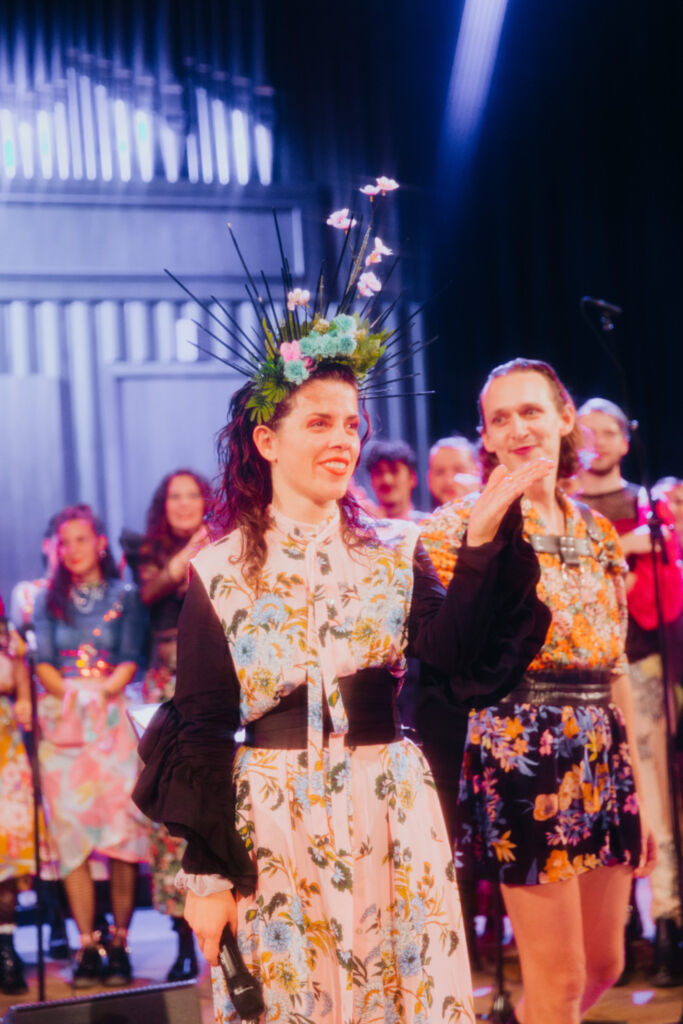It was in 2014 that the formally trained music therapist Verena Giesinger assumed musical leadership of the Wiener Schmusechor, a choir she’d founded herself—thereby veering off from her former professional path to embark upon a new career. Today, the mdw graduate has found fulfilment in conducting and is setting an example for more diversity in the music scene with her exceptional ensemble.

“I grew up in a musical family, so music’s played a huge role in my life since the very beginning.” Verena Giesinger took her first violin lessons as a six-year-old and added piano four years later. She first attended a music-focused school in Götzis and then continued her education at an academic secondary school that likewise featured a music specialisation. “I played in orchestras, trios, and quartets. Music had always been important to me, and it was something I wanted to put a lot of time into,” recalls the Vorarlberg native. Even so, she was rankled by how it was exclusively classical musical training that was on offer in the area where she grew up. “All we did at school was analyse Mozart and Haydn. For me, that wasn’t enough. I’d always been more drawn to music that I could understand on an emotional level, like pop. That was what accompanied me in my everyday life—not music composed 200 years ago and only by men.”
It’s in conducting that I’ve found professional fulfilment and discovered who I want to be onstage.
The urge to dig into something she could identify with personally was what led this young musician to study music therapy. “That programme was a wonderful way for me to discover a different approach to music-making. What’s more, I believed back then that a career in social work would be the right choice for me—though I now think that belief was probably due more to gender stereotypes.” As a music therapist-in-training, Giesinger experienced fellow students and teaching faculty in ways that still influence her today. She describes her individual therapist Kristine Dudzus, for example, as a role model for the music therapy profession and a strong, self-confident female figure. “She supported me in critically scrutinising my choice of occupation and also helped me realise what it means to be a woman. I still think quite often of the things she said to me during my studies.”
I followed music therapy with studies in culture and media management at the Hamburg University of Music and Theatre; both of these fields were puzzle pieces that led me to my present line of work.
Following graduation, Verena Giesinger took a job as a music therapist in the adult psychiatry ward at Vienna’s Donauspital. She soon realised, however, that she didn’t want to employ music purely as a therapeutic tool. “I rediscovered my desire to make music not just for others but, in fact, more for myself. That’s why I ended up starting my own choir alongside my work as a therapist.” Due to her classical instrumental training and the associated competitive thinking, the young musician had often felt subject to quite a bit of pressure as a kid. Choral singing in multiple parts, however, enabled her to make music more freely without the constant burden of expecting things from herself. And soon, what began as a home-based hobby developed into a professional choir that needed a conductor: it was thus that Verena Giesinger assumed musical directorship of the Wiener Schmusechor in 2014 and finally discovered her true passion. “My sense is that I needed to follow my own path, one that led away from classical training, in order to rediscover music for myself.”

Since then, her successful pop choir of around fifty members has become a permanent fixture of the Austrian music scene. Alongside its unusual repertoire, extravagant costumes, and intriguing collaborative projects in the realms of theatre, fine art, dance, and film, the Schmusechor also takes a clear stand against sexism and racism. “Right at the beginning, we decided that if we ever got a chance to hit the big stage, we’d use it to reach people with political messages we found important and view doing so as a certain responsibility of ours. It’s a commitment that we’ve upheld to this day.” Their success in getting these messages across is testified to by the feedback they receive, some of which is truly touching and encouraging. “The input we get is that people take home new ideas from our concerts and feel understood. There’s also criticism, of course—from people who don’t share our political stance.”
An educational institution can shine a spotlight on certain paths forward, but that doesn’t mean they’re the ones you have to take.
Despite her professional reorientation, she’s glad she decided to study music therapy in light of how she continues to use the tools she learned there. “That training expanded my horizon in terms of how music can be experienced and expressed. It was there that I first understood how making music is about more than just reproducing notes—how it’s possible to take a much freer approach to your own voice or instrument. There’s no right or wrong; you decide yourself what your own music can be.” Verena Giesinger wishes today’s students the ability to work more with and less against each other. To this dedicated artist, competition in music has always seemed counterproductive and even scary. “I think we can learn more from each other if we make an effort to address the idea of competition and then take steps to depart from it.”
